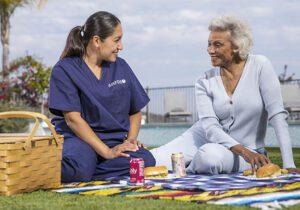As we turn the calendar to August and National Immunization Awareness Month—we are reminded of the vital role that vaccines play in keeping people healthy throughout their lifetime. While we often associate vaccines with childhood, immunizations remain critically important well into older adulthood.
For seniors, whose immune systems naturally weaken with age, staying up to date on recommended vaccines can mean the difference between a mild illness and a serious health crisis.
Why Immunizations Matter More as We Age
As we grow older and enter the senior years, our immune response becomes less robust. This means infections can hit harder, last longer, and lead to serious complications. According to the Centers for Disease Control and Prevention (CDC):
- About 70–85% of seasonal flu-related deaths and 50–70% of flu-related hospitalizations occur among people aged 65 and older.
- Seniors are 10 times more likely than younger adults to be hospitalized from shingles complications.
- Pneumonia and related infections remain among the top 10 causes of death in older adults.
Vaccines can help reduce the risk of these illnesses or lessen their severity, helping seniors maintain their independence, avoid hospital stays, and continue doing what they love.
Recommended Vaccines for Seniors
Older adults should talk with their healthcare provider about which vaccines are right for them. The CDC currently recommends the following for most adults aged 65+:
- Influenza (Flu) vaccine – every year, preferably before flu season begins.
- COVID-19 vaccine and boosters – as recommended based on current guidance.
- Pneumococcal vaccines – protect against pneumonia, bloodstream infections, and meningitis.
- Shingles (Herpes Zoster) vaccine – typically given in two doses starting at age 50.
- Tdap (Tetanus, Diphtheria, Pertussis) or Td booster – every 10 years.
- RSV (Respiratory Syncytial Virus) vaccine – now available and recommended for many adults 60+, based on shared clinical decision-making.
Questions About Vaccines for Seniors to Ask Their Doctors
It’s easy to feel overwhelmed by the variety of immunizations, but seniors need to know that their primary physician or other healthcare provider guidance. Here are some good questions to ask:
- Which vaccines do I need based on my age and health history?
- Am I due for any booster shots?
- Will any of these vaccines interfere with medications I’m taking?
- Are there vaccines I should avoid due to allergies or medical conditions?
- Is it safe to get multiple vaccines at the same time?
- Are these vaccines covered by Medicare or my insurance plan?
How Seniors Can Protect Themselves—and Others
Getting vaccinated doesn’t just protect seniors; it also helps protects their family, friends, and community. By reducing the spread of infectious diseases, we’re all doing our part to keep those around us safe—especially infants, people with weakened immune systems, and others who can’t be vaccinated.
Home Care Can Help Seniors Maintain Their Health and Wellness
At Amada Senior Care, we support seniors in staying on top of their wellness needs, including immunizations. Our caregivers can help with appointment reminders, transportation to the doctor’s office or pharmacy, and aftercare support if a vaccine causes temporary side effects like fatigue or soreness.
This August, seniors and their families are encouraged to use National Immunization Awareness Month as an opportunity to check in with doctors, ask the right questions, and take simple, proactive steps toward better health.
Need help managing appointments or getting to your next doctor’s visit? Amada Senior Care is here to support your health and independence—every step of the way. CLICK HERE to find an Amada office near you and request a complimentary care needs assessment.















